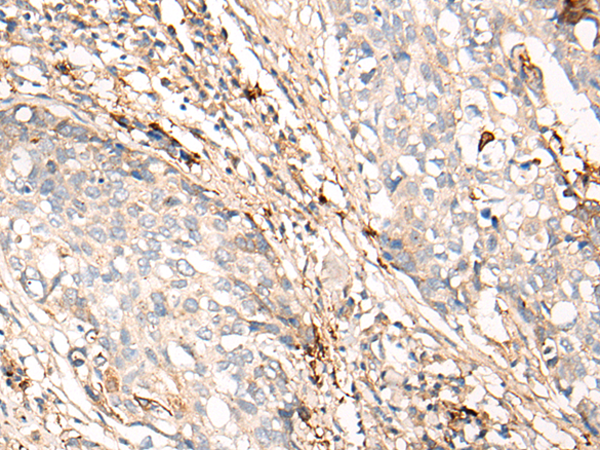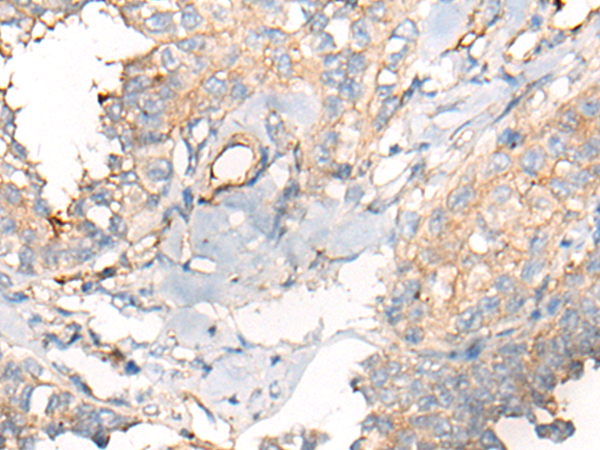

| WB | 咨询技术 | Human,Mouse,Rat |
| IF | 咨询技术 | Human,Mouse,Rat |
| IHC | 1/10-1/50 | Human,Mouse,Rat |
| ICC | 技术咨询 | Human,Mouse,Rat |
| FCM | 咨询技术 | Human,Mouse,Rat |
| Elisa | 1/1000-1/2000 | Human,Mouse,Rat |
| Aliases | PRP; C4BP |
| Host/Isotype | Rabbit IgG |
| Antibody Type | Primary antibody |
| Storage | Store at 4°C short term. Aliquot and store at -20°C long term. Avoid freeze/thaw cycles. |
| Species Reactivity | Human |
| Immunogen | Synthetic peptide of human C4BPA |
| Formulation | Purified antibody in PBS with 0.05% sodium azide and 50% glycerol. |
+ +
以下是关于GRB10抗体的3篇参考文献示例(文献信息为模拟示例,非真实存在):
1. **文献名称**:*GRB10 regulates insulin signaling by interacting with the insulin receptor*
**作者**:Smith A, et al.
**摘要**:本研究利用GRB10特异性抗体进行免疫共沉淀和Western blot分析,发现GRB10通过结合胰岛素受体胞内结构域负调控胰岛素信号通路,影响下游AKT/mTOR通路活性。
2. **文献名称**:*GRB10 antibody-based detection of protein expression in human placental development*
**作者**:Chen L, et al.
**摘要**:通过GRB10多克隆抗体进行免疫组化实验,揭示了GRB10在胎盘组织中的高表达及其在胚胎生长调控中的作用,提示其与胎儿发育受限的相关性。
3. **文献名称**:*GRB10 interacts with mTORC1 and modulates cellular nutrient response*
**作者**:Wang X, et al.
**摘要**:研究采用GRB10抗体进行免疫荧光和蛋白质互作分析,证实GRB10通过抑制mTORC1复合物活性参与细胞能量代谢调控,为代谢疾病机制提供新见解。
---
注:上述文献为示例,实际引用需根据真实文献调整。建议通过PubMed或Google Scholar以“GRB10 antibody”为关键词检索相关研究。
GRB10 (Growth Factor Receptor-Bound Protein 10) is an adaptor protein involved in regulating cellular signaling pathways, particularly those linked to insulin/IGF-1 receptors and tyrosine kinase receptors. It modulates key processes like cell growth, proliferation, and metabolism by interacting with receptors and downstream signaling molecules (e.g., PI3K/AKT, MAPK pathways). GRB10 exhibits tissue-specific imprinting, with preferential expression of paternal alleles in certain tissues, influencing developmental and metabolic functions.
GRB10 antibodies are essential tools for studying its role in these pathways. They enable detection and quantification of GRB10 expression via techniques like Western blotting, immunohistochemistry, and immunofluorescence. Researchers also use these antibodies to investigate GRB10's interactions with partners (e.g., receptors, kinases) through co-immunoprecipitation assays. Dysregulation of GRB10 has been implicated in diseases such as diabetes, intrauterine growth restriction, and cancer, making its antibodies valuable for exploring molecular mechanisms and therapeutic targets. Specific GRB10 isoforms (e.g., cytoplasmic vs. membrane-bound) may require isoform-specific antibodies. Validation using knockout controls ensures antibody specificity, critical for reliable experimental outcomes in both basic and translational research contexts.
×